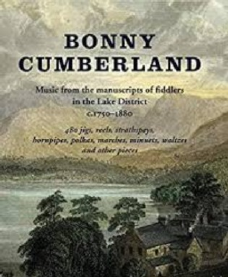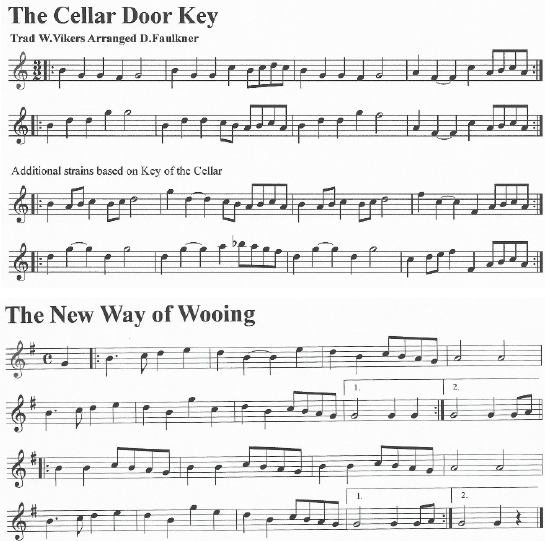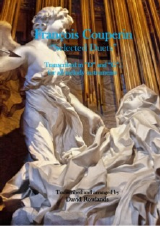The Bagpipe Society
Review: Bonny Cumberland, John Offord
Bonny Cumberland - Music from the manuscripts of fiddlers in the Lake DistrictC.1750-1880 compiled by John Offord
Cumberland is a historic county of North West England. Cumberland and the neighbouring Westmorland contained the area known as the Lake District. The position of this area and its proximity to Northumberland and the Scottish borders just tells me that a music of book from around there means there are going to be pipe tunes hidden in it.

The book opens with an introduction by John Offord, setting out a short history of Cumbrian music and the types of tunes that will be found in the book. This is followed by an extract from the Journal of the Lakeland Dialect Society, November 1939, written by British folk song collector Anne Gilchrist. She talks about the culture and music of the place in the late 1800’s and early 1900’s. After this there is a short section listing a few dances from the area and gives dance notation for them. It is great to have this sort of context for the book and is all worth a read. The back end of the book talks about the manuscript sources and gives notes on the tunes and transcription changes which have been made, it also contains the tune index.
The 480 tunes make the centre and bulk of the book. This is organised into sections starting with 4/4, reels, hornpipes, polkas etc, 6/8 and 9/8 jigs and then 3/2 and 3/4, plus a couple of extra things as well. The tunes are clearly laid out and easy to read. The tunes are mostly written out with one or two sharps in the key signatures, there are a few exceptions. The book is lightened throughout with illustrations.
It always amazes me how cosmopolitan the traditional folk music and those times were. As well as sharing music with perhaps the expected sources, such as Dixon and Vickers, the manuscripts also share tunes found in sources geographically far away such as the Baring-Gould manuscripts in South West Devon and collections in East Devon. Tunes having travelled (in distance and time!) often evolve and change, they can also take on corrupted or new titles. This is something to look for and explore.
When I read and play through books like this I try and find tunes that I consider good or authentic pipe tunes (whatever that might mean!); tunes that I can play easily on the pipes; tunes that suit drone accompaniment; tunes that I can adapt and change; and tunes where I can take ideas from and then use in tunes and versions of tunes that I already play! I like to have some fun doing this, and perhaps be forced to improve my playing techniques and reading skills.
There are quite a number of tunes in this book that immediately fit the range of the pipes. (Depending on your instrument!) However, working with a book like this may mean developing skills in transposition, which a really good thing to do. Not everything will be in the key that you like to read and play in!

There are some epic versions of tunes like Black Joak, The Major, The Black and Grey and Jack Latton. You will find that not all the variations will suit the pipes but they could be adapted or the ideas taken into versions that do fit the pipes, or just miss the non-playable bits out!
Tunes such as Through the Wood Spinning are written in three sharps.
The first thing I would do is to read it and find a good starting key to play on the pipes. In my case it might be for G pipes. So, I’ll play it in G, but it requires a sharpened lower leading note. Change this this to flattened one, and the top one too? Also, it has a low note that I can’t play! How about putting this up an octave?! In a quick moment it becomes a pipe tune. Then I still have to make a decision as to whether I like the tune!
I play a version of the Cellar Door Key which is pretty much the version in Vickers. In Bonny Cumberland it is a three strain tune called The Key of the Cellar. Here I have adapted and used the last two strains of this version to complement the version I already play. To find the original in Bonny Cumberland you will have to get the book.
The New Way of Wooing is another tune easily adapted to suite the pipes. Originally the first four bars of the B music were up an octave. I just dropped them down and voila! I also transposed it from D into G for continuity’s sake.

I suppose what I am getting at is that as well as playing the obvious tunes we can be creative about how we find and use repertoire for the pipes. And this
book is great for that. In some instances, it is as simple as just playing the B part of a tune down an octave. It is a case of looking with a creative mind and using a bit of imagination.
It is of no surprise to me that the section containing hornpipes offers the least in terms what can be played on the pipes. There are a few tunes but they require working on.
Each tune in the book is marked with letters and numbers indicating which manuscript they come from. There is sometimes discrepancy with the letters and the names given to the manuscripts in the back of the book making it confusing to match them up. There are also a few musical typos, but this is no big deal either.

Books like this don’t come around very often. I am really enjoying having it and I continue to get a lot out of it. I am sure I will return to it often. Even if not all the tunes are for pipes I can play them on something else! At £21.50 the book is the price of a couple of pizzas, only it is worth a lot more! It will give pleasure and interest for a long time. Get the book and support John’s magnificent efforts, and at the same time extend your repertoire, knowledge and ability. https://www.johnofthegreen.co.uk/ £21.50 inc P&P
- Data Processing Notice (GDPR)
-
@BagpipeSociety on X (formally known as Twitter)
-
TheBagpipeSociety on Instagram
-
 BagpipeSociety on Facebook
BagpipeSociety on Facebook
Something wrong or missing from this page? Let us know!
